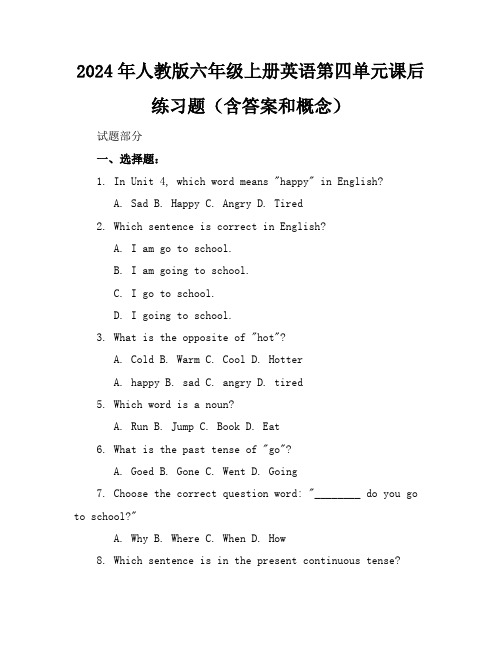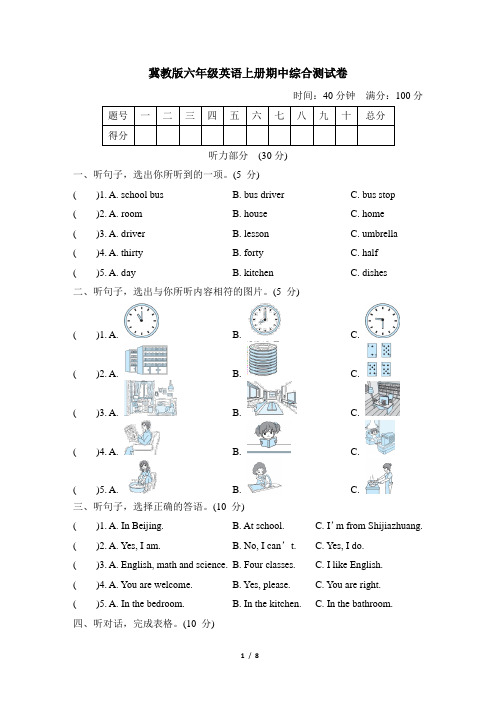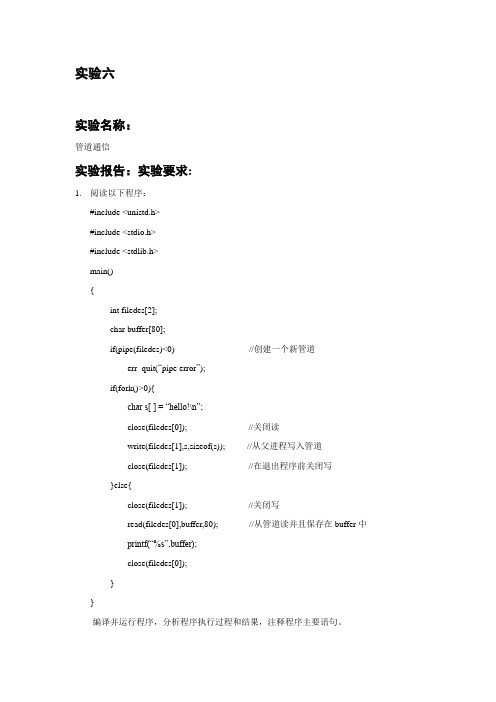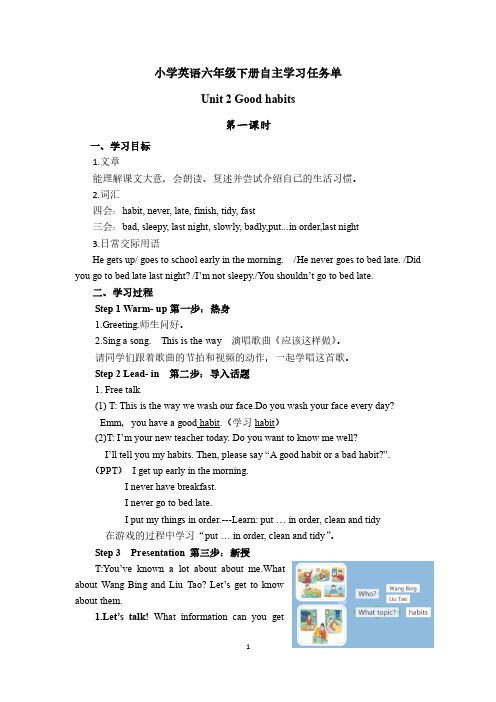homework_6
八年级英语强调句型综合练习题40题含答案解析

八年级英语强调句型综合练习题40题含答案解析1.It is in this classroom that we have our English class.A.It is in this classroom which we have our English class.B.It is this classroom that we have our English class in.C.It is in this classroom where we have our English class.答案解析:B。
强调句型的基本结构是It is/was+被强调部分+that/who+其他部分。
A 选项中which 不能用于强调句型;C 选项中where 不能用于强调句型,应该用that。
本题强调的是in this classroom,所以完整的句子应该是It is this classroom that we have our English class in。
2.It was Tom who broke the window.A.It was Tom which broke the window.B.It was Tom that breaks the window.C.It was Tom whom broke the window.答案解析:A 选项中which 不能用于强调句型中强调人;B 选项中时态错误,原句是过去时,这里应该用broke;C 选项中whom 虽然可以用于强调句型中强调人,但在本句中作主语,应该用who。
正确答案是It was Tom who broke the window。
3.It is on Sunday that we usually go for a picnic.A.It is on Sunday when we usually go for a picnic.B.It is Sunday that we usually go for a picnic on.C.It is on Sunday where we usually go for a picnic.答案解析:B。
2024年人教版六年级上册英语第四单元课后练习题(含答案和概念)

2024年人教版六年级上册英语第四单元课后练习题(含答案和概念)试题部分一、选择题:1. In Unit 4, which word means "happy" in English?A. SadB. HappyC. AngryD. Tired2. Which sentence is correct in English?A. I am go to school.B. I am going to school.C. I go to school.D. I going to school.3. What is the opposite of "hot"?A. ColdB. WarmC. CoolD. HotterA. happyB. sadC. angryD. tired5. Which word is a noun?A. RunB. JumpC. BookD. Eat6. What is the past tense of "go"?A. GoedB. GoneC. WentD. Going7. Choose the correct question word: "________ do you go to school?"A. WhyB. WhereC. WhenD. How8. Which sentence is in the present continuous tense?A. She eats an apple.B. She is eating an apple.C. She ate an apple.D. She will eat an apple.9. What is the plural form of "child"?A. ChildsB. ChildrenC. ChildD. Childes10. Which word is an adjective?A. RunB. JumpC. HappyD. Eat二、判断题:1. "I am happy" and "I am sad" have the same meaning. ( )2. "She is going to the library" means she will go to the library in the future. ( )3. "He is reading a book" is in the past tense. ( )4. "They are playing football" is a correct sentence. ( )5. "I am go to the park" is a correct sentence. ( )6. "She is happy because she got a good grade" is a positive sentence. ( )7. "He is not tired" means he is very energetic. ( )8. "The cat is sleeping on the sofa" is a present continuous tense sentence. ( )9. "Apples" is the plural form of "Apple". ( )10. "She is eating an apple" and "She eats an apple" have the same meaning. ( )三、填空题:1. The opposite of "big" is ________.2. "I ________ to the movies last night" is a past tense sentence.3. The plural form of "mouse" is ________.4. "She is ________ because her birthday is tomorrow" isa positive sentence.5. The question word "________" is used to ask about the time.6. "________ am" is the first person singular form of the verb "be" in the present tense.7. "He is ________ a book" is a present continuous tense sentence.8. "They ________ to the park every weekend" is a present simple tense sentence.9. "I like to ________ in the morning" is a sentence about a habit.10. "________ you like some tea?" is a polite way tooffer tea.11. "I ________ my homework already" means the homework is finished.12. "She ________ a new dress for the party" is a sentence about preparing for an event.13. "________ you speak English?" is a question asking about someone's language ability.14. "He ________ to the store and bought some milk" is a sentence about a sequence of actions.15. "________ is your favorite color?" is a question asking about personal preference.16. "We ________ to the zoo last year" is a sentence about a past event.17. "She ________ a sandwich for lunch" is a sentence about a routine.18. "________ are you going?" is a question asking about someone's destination.19. "They ________ their homework at the library" is a sentence about a location.四、简答题:1. What is the difference between "I am" and "I do"?2. Explain the use of the present continuous tense.3. How do you form the past tense of regular verbs?4. What is the difference between "I like" and "I would like"?5. Write a sentence using the present perfect tense.6. Explain how to make a question in English.7. What is the plural form of "tooth"?9. Write a sentence using the word "although".10. Explain the difference between "some" and "any".一、选择题答案:1. B2. B3. A4. B5. C6. C7. B8. B9. B10. C二、判断题答案:1. ×2. √3. ×4. √5. ×6. √7. ×8. √9. √10. ×三、填空题答案:1. small2. went3. mice4. excited5. When6. I7. reading8. go9. exercise10. Would11. have done12. made13. Can14. went15. What16. went17. has18. Where19. do20. Where四、简答题答案:1. "I am" is used to describe a state or condition, while "I do" is used to emphasize an action.2. The present continuous tense is used for actions happening now, actions that are temporary, and for expressing irritation about a repeated action.3. Regular verbs form the past tense adding ed to the base form of the verb.4. "I like" is used to express a general preference,while "I would like" is more polite and is often used when making a request.5. "I have finished my homework."6. To make a question in English, you can use question words (who, what, where, when, why, how), auxiliary verbs (do, does, did, can, could, will, would, is, are, was, were), or invert the subject and verb (especially with be verbs).7. teeth9. "Although it was raining, they decided to go for a walk."10. "Some" is used in positive sentences and questions when you expect a positive answer, while "any" is used in negative sentences and questions.Sentence Structure: Positive and negative sentences, questions, using "some" and "any", making requests.各题型知识点详解和示例:选择题: Test students' understanding of vocabulary, grammar rules, and sentence structure.Example: Knowing the difference between "happy" and "sad" (vocabulary) and identifying the correct verb tense (grammar).判断题: Assess students' ability to recognize correct and incorrect sentence formation and grammar usage.Example: Distinguishing between the correct past tense form "went" and the incorrect "goed".Example: Filling in the correct form of the verb "be" in the present tense: "I am".简答题: Measure students' ability to explain grammatical concepts and construct sentences.Example: Explaining the use of the present continuous tense and providing a sentence as an example.。
冀教版六年级英语上册期中综合测试卷含答案

冀教版六年级英语上册期中综合测试卷时间:40分钟满分:100分题号一二三四五六七八九十总分得分听力部分(30分)一、听句子,选出你所听到的一项。
(5 分)( )1. A. school bus B. bus driver C. bus stop ( )2. A. room B. house C. home( )3. A. driver B. lesson C. umbrella ( )4. A. thirty B. forty C. half( )5. A. day B. kitchen C. dishes二、听句子,选出与你所听内容相符的图片。
(5 分)( )1. A. B. C.( )2. A. B. C.( )3. A. B. C.( )4. A. B. C.( )5. A. B. C.三、听句子,选择正确的答语。
(10 分)( )1. A. In Beijing. B. At school. C. I’m from Shijiazhuang. ( )2. A. Yes, I am. B. No, I can’t. C. Yes, I do.( )3. A. English, math and science. B. Four classes. C. I like English.( )4. A. You are welcome. B. Yes, please. C. You are right.( )5. A. In the bedroom. B. In the kitchen. C. In the bathroom.四、听对话,完成表格。
(10 分)Do homework Read books Watch TV Tom 1.______________ 3.____________ ALucy 2.______________ A 4._____________Lily A A 5._____________ A=always O=often S=sometimes N=never笔试部分(70分)五、读一读,根据句意、首字母及图片提示写单词,补全句子。
OS-homework-6

实验六实验名称:管道通信实验报告:实验要求:1.阅读以下程序:#include <unistd.h>#include <stdio.h>#include <stdlib.h>main(){int filedes[2];char buffer[80];if(pipe(filedes)<0) //创建一个新管道err_quit(“pipe error”);if(fork()>0){char s[ ] = “hello!\n”;close(filedes[0]); //关闭读write(filedes[1],s,sizeof(s)); //从父进程写入管道close(filedes[1]); //在退出程序前关闭写}else{close(filedes[1]); //关闭写read(filedes[0],buffer,80); //从管道读并且保存在buffer中printf(“%s”,buffer);close(filedes[0]);}}编译并运行程序,分析程序执行过程和结果,注释程序主要语句。
2.阅读以下程序:#include<sys/types.h>#include<sys/stat.h>#include<fcntl.h>main(){char buffer[80];int fd;unlink(FIFO); //(如果有FIFO文件,先删掉)mkfifo(FIFO,0666); //创建一个FIFO文件if(fork()>0){char s[ ] = “hello!\n”;fd = open (“FIFO”,O_WRONL Y); //此处是文件名FIFO加上引号write(fd,s,sizeof(s));close(fd);}else{fd= open(FIFO,O_RDONL Y);read(fd,buffer,80);printf(“%s”,buffer);close(fd);}}编译并运行程序,分析程序执行过程和结果,注释程序主要语句。
译林版小学英语六年级下册第二单元自主学习任务单

小学英语六年级下册自主学习任务单Unit 2 Good habits第一课时一、学习目标1.文章能理解课文大意,会朗读、复述并尝试介绍自己的生活习惯。
2.词汇四会:habit, never, late, finish, tidy, fast三会:bad, sleepy, last night, slowly, badly,put...in order,last night3.日常交际用语He gets up/ goes to school early in the morning. /He never goes to bed late. /Did you go to bed late last night? /I’m not sleepy./You shouldn’t go to bed late.二、学习过程Step 1 Warm- up第一步:热身1.Greeting.师生问好。
2.Sing a song. This is the way 演唱歌曲《应该这样做》。
请同学们跟着歌曲的节拍和视频的动作,一起学唱这首歌。
Step 2 Lead- in 第二步:导入话题1. Free talk(1) T: This is the way we wash our face.Do you wash your face every day?Emm,you have a good habit.(学习habit)(2)T: I’m your new teacher today. Do you want to know me well?I’ll tell you my habits. Then, please say “A good habit or a bad habit?”.(PPT)I get up early in the morning.I never have breakfast.I never go to bed late.I put my things in order.---Learn: put … in order, clean and tidy在游戏的过程中学习“put … in order, clean and tidy”。
六年级中英互译

Homework4-6单元星期六有一个邮票展__________________________________________让我们一起去吧__________________________________________我有一个朋友,他能和我们一起去吗?__________________________________________我很高兴有一个笔友__________________________________________我的双胞胎姐妹喜欢画画__________________________________________我们看上去一样,但我们喜欢不一样的东西__________________________________________ 高速我一些关于你的事情__________________________________________澳大利亚肯定很有趣__________________________________________你的笔友住在上海吗?不,他住在北京__________________________________________他教你数学吗?是的?__________________________________________他坐公车上班__________________________________________他们看上去一样,但他们很不一样__________________________________________她妹妹电视上看卡通__________________________________________我每周和Alice写邮件__________________________________________Alice说她家庭马上来中国了__________________________________________我很兴奋__________________________________________你妈妈是做什么的?他是电视台记者__________________________________________他是谁?__________________________________________她真的很漂亮__________________________________________他为我阿姨写电视节目__________________________________________多令人兴奋啊__________________________________________有时他在北京工作,有时在香港工作__________________________________________她在哪里上班?她在汽车公司上班__________________________________________她怎么去上班的?__________________________________________她设计车__________________________________________如果你喜欢画画,你可以成为一个工程师__________________________________________ 她帮助银行更好的使用他们的钱__________________________________________她喜欢和数字打交道__________________________________________他公车上班,但他喜欢走路回家__________________________________________她经常帮助旅行者找到他们的路__________________________________________水是怎样变成水汽的?__________________________________________阳光照耀,水变成水蒸汽__________________________________________这是晴朗的一天__________________________________________他感觉到很热__________________________________________可能天空上面会凉快些__________________________________________小水珠越升越高__________________________________________她遇到很多另外的小水珠__________________________________________我正往下掉呢__________________________________________小水珠和她的一些朋友掉进湖里__________________________________________太阳出来了__________________________________________你能带我再升到天上吗?__________________________________________你怎样植树?__________________________________________给他们浇水,几天后,你可以看见嫩芽__________________________________________我把一些种子放入容器中__________________________________________我把它放在太阳下__________________________________________我每天浇水,确保它得到足够的太阳__________________________________________我的植物一个月了__________________________________________我等不及了__________________________________________1-3单元你怎么去上学的?__________________________________________我家很近,通常我走路去上学,有时候骑车__________________________________________ 今天下午让我们一起去公园吧__________________________________________你家在哪里?__________________________________________我家在邮局附近__________________________________________2点见__________________________________________我怎么去中山公园?__________________________________________我能步行去吗__________________________________________可以,如果你愿意__________________________________________交通灯在每个国家都是一样的__________________________________________有三种颜色,红黄绿__________________________________________在中国,司机在马路右边开车__________________________________________你必须知道交通规则__________________________________________附近有电影院吗?有的__________________________________________离这里远吗__________________________________________不,不远__________________________________________你放学后打算做什么?__________________________________________我想买两双鞋子__________________________________________电影院下去,直走三分钟__________________________________________在书店右转,它在电影院东边__________________________________________周六下午6:00来我12岁生日派对__________________________________________ 在学校前的公交车站开始__________________________________________坐17路车__________________________________________找到左边的白色建筑__________________________________________门的附近找我__________________________________________你周末打算做什么__________________________________________我将会有一个忙碌的周末__________________________________________我将要回家读新书__________________________________________周日我要和妈妈去超市__________________________________________我们午饭后过去__________________________________________你下午去哪里?__________________________________________你要去买什么?__________________________________________你什么时候去?__________________________________________你打算怎么去?__________________________________________我打算去植树__________________________________________另外的,让我想想__________________________________________你要用书吗__________________________________________是的,我打算买一本关于植物的书__________________________________________ 有一天我想做科学老师__________________________________________等一会__________________________________________我向去南门的宠物店__________________________________________有一个大的滑冰场__________________________________________。
Unit 12 第6课时 Section B (教学课件)-九年级英语全一册(人教新目标)
While-writing
My lucky/ unlucky day
妙构思
开篇点题
I will always remember the date... This was the luckiest/ unluckiest day of my life...
阐述经历
When I woke up that morning... Later that day... I couldn’t believe... Then/After that,... Finally,...
3a
Can you remember a lucky or an unlucky day? What happened? Make some notes about what you remember.
Examples
catch the bus
rush out of the door run quickly / fast to catch the bus be out of breath after my run
• Finally, …
• I think … • What a lucky/an unlucky day!
总结感慨
While-writing
单元话题导语
本单元以“unexpected events”为话题展开学习, 重点学习了语法——过去完成时态。该话题涉及内容 较多,可以讲述自己的亲身经历,也可以讲述自己 的亲眼所见或亲耳所闻。话题命题形式常采用语言 描述形式,涉及日记、记叙文等文体。具体到本单 元书面表达中,要求同学们能运用一般过去时和过 去完成时描述自己或他人的经历。
While-writing
Sample Writing 1
Homework6参考答案
Z Visa is the fundamental needed visa issued to foreigners who are to take up posts or employment in China and to their accompanying family members by the Chinese visa authorities for entry or exit from the Chinese territory. Foreigners who are to take up posts or work in Guangzhou shall have handled Z Visa before entry into China.Applicant's Documents(consult visa authorities for details)1.Original 'Foreign Experts Working Permit'2.Notification Letter for Z visa application issued by authorized official department3.Valid passport4.A completed visa application form.5.One recent passport sized photograph (one inch half-length, bareheaded and full-faced)Notice: To apply for Notification Letter for Z visa application, please contact Passport & Visa Division of Foreign Affairs Office, the People's Government of Guangzhou Municipality. Tel: 83172462, Address: Room502, 5th Floor, Guangzhou Foreign Business Street, Guangren Road.(译文)为了使我能再回中国,停留一年,上个星期一(7月19日),我从南京出发前往北京,延长我的工作签证。
人教版八年级英语上册二次备课教学设计(含答案):Unit2 How often do you exercise(6课时)
Unit 2How often do you exercise?第一课时 Section A (1a ~1c)§自主学习案写出下列单词。
总是 always 有时候 sometimes通常 usually 从不 never经常 often§课堂导学案Step 1 准备与热身(Preparation )Good morning! Today we shall take up the second unit in this new term: Unit 2 How often do you exercise? Please open your books at page 9.T: Look at picture a .What is she doing?S 1: She is going shopping.T: Do you usually go shopping?S 2: No, I don't.T: What do you do on weekends?S 3:I often play football.T :What do you do on weekends?S 4:I sometimes go shopping.Step 2 呈现与输入 (Presentation )Open your book at page 9. Let's look at 1a.Each thought bubble shows something a person does on weekends. Now please look at the picture carefully and describeit.Name each activity:T:Good. Please look at the picture again and list all the activities.If you finish it first, write the answer on the blackboard.Now let's check the answers on the blackboard together.Keys:1.help with homework 2.watch TV 3.read 4.exercise 5.shopStep 3练习与体验(Practice)Look at the pictures again and tell what the person does on weekends.Good. Next, please listen to the conversation.The people are talking about what they do on weekends. First listen to the tape carefully and find how often they do on weekends.Next listen again and write the letter of one activity after the word in the list. For example, on the recording someone says,“I always go shopping.”Shopping is letter a in the picture in activity 1a.So you put an “a” after the word “always”in this list.Then listen to the tape the third time and check the answers.Step 4运用与生成(Production)After talking about the picture,we get to understand the activities.Now in pairs ask your partner about the people in the picture.A:What does he do on weekends?B:He usually watches TV.A:Does he go shopping?B:No, he never goes shopping.Step 5巩固与提高(Progress)【探究点】What do you usually do on weekends?周末你通常做什么?①该句是由what引导的特殊疑问句。
《My day》四年级英语(下)课件稿
(C ) 4. What do you have?
basketballs.
(D ) 5. How many footballs do you D. Twelve.
have?
E. It’s Tuesday.
My day
基础知识
重点单词
ually 通常,常常 2.lunch
午饭
3.home 家
I get up at seven. 我7点起床。 I usually go to school at seven forty. 我通常在7点40分去学校。 I have four lessons in the morning. 我上午有四节课。 I have lunch at twelve. 我在12点吃午餐。
_你__想__要___现__在__吃___早__餐_ 吗?
Words
dinner [ˈdinə]
作名词,意为“晚餐,晚宴;宴会;正餐”。 常用短语:after dinner 餐后
family dinner 家宴 eg: We usually have dinner at 6 o’clock pm.
14.at seven
在七点
15.my day
我的一天
16.over there
在那边
17.have four lessons 有四节课
重点句型
1.I usually go to school at seven forty. 我通常七点四十去上学。
2.I have lunch at twelve. 我十二点吃午饭。
5.我通常在七点钟看电视。 I _u_s_u_a_ll_ywa_t_c_h__T_V____se_v_eant ______.
- 1、下载文档前请自行甄别文档内容的完整性,平台不提供额外的编辑、内容补充、找答案等附加服务。
- 2、"仅部分预览"的文档,不可在线预览部分如存在完整性等问题,可反馈申请退款(可完整预览的文档不适用该条件!)。
- 3、如文档侵犯您的权益,请联系客服反馈,我们会尽快为您处理(人工客服工作时间:9:00-18:30)。
1.
Linear prediction analysis is used to obtain an eleventh-order all-pole model for a segment of voiced speech that was sampled at a rate of Fs =8000 samples/second. The system function of the model is:
11
111
11()()11k
k i k i G G G H z A z z z z α−−=====−−∑∏ Table 1 shows five of the roots of the eleventh-order prediction error filter,()A z
.
Table 1: Root locations of eleventh-order prediction error filter in the z-plane (a) Determine where the other six zeros of ()A z are located in the z-plane. If you cannot precisely determine the pole locations, explain where the pole might occur in the z-plane.
(b) Estimate the first three formant frequencies(in Hz) for this segment of speech. (c) Which of the first three formant resonances has the smallest bandwidth? How is this determined?
2. A casual LTI system has system function:
1
12314()10.250.750.875z H z z z z
−−−−−=−−− (a) Use the Levinson-Durbin recursion to determine whether or not the system is stable.
(b) Is the system minimum phase?
3.
A speech signal frame (windowed using a Hamming window) has energy:
(0)2
[]1000n n
m E s m ==∑
Using the autocorrelation method of analysis on this speech frame, the first 3
PARCOR coefficients are computed and their values are:
1230.5
0.40.5
k k k =−==
Find the energy of the linear prediction residual, 32[]n n m
E e m =∑that would be
obtained by inverse filtering []n s m by the optimal third order predictor inverse filter, 3()A z .。
